外研版(2019)选择性必修第三册Unit 5 Learning from nature Developing ideas 课件(共25张PPT)
文档属性
| 名称 | 外研版(2019)选择性必修第三册Unit 5 Learning from nature Developing ideas 课件(共25张PPT) |  | |
| 格式 | pptx | ||
| 文件大小 | 6.6MB | ||
| 资源类型 | 教案 | ||
| 版本资源 | 外研版(2019) | ||
| 科目 | 英语 | ||
| 更新时间 | 2024-05-10 15:16:27 | ||
图片预览

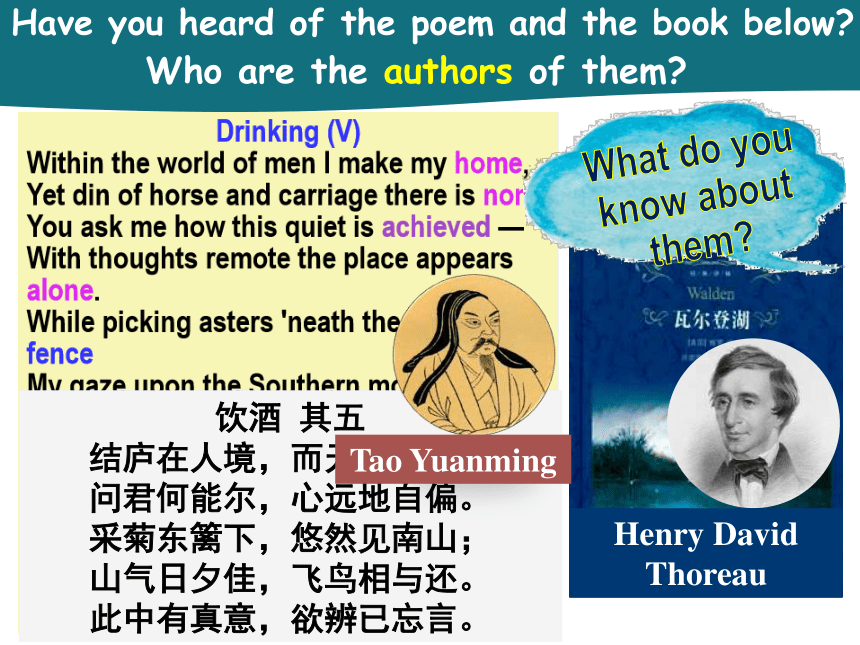
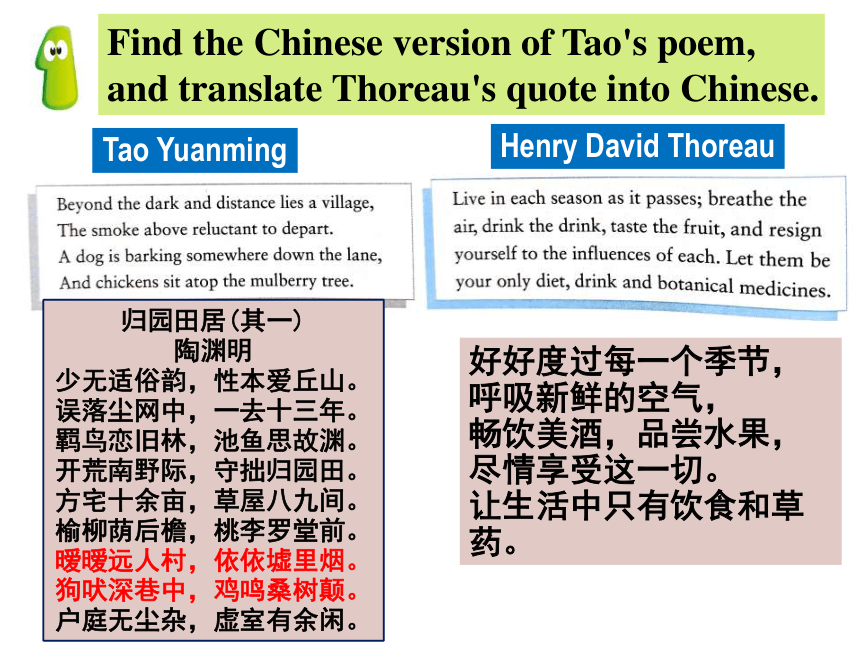

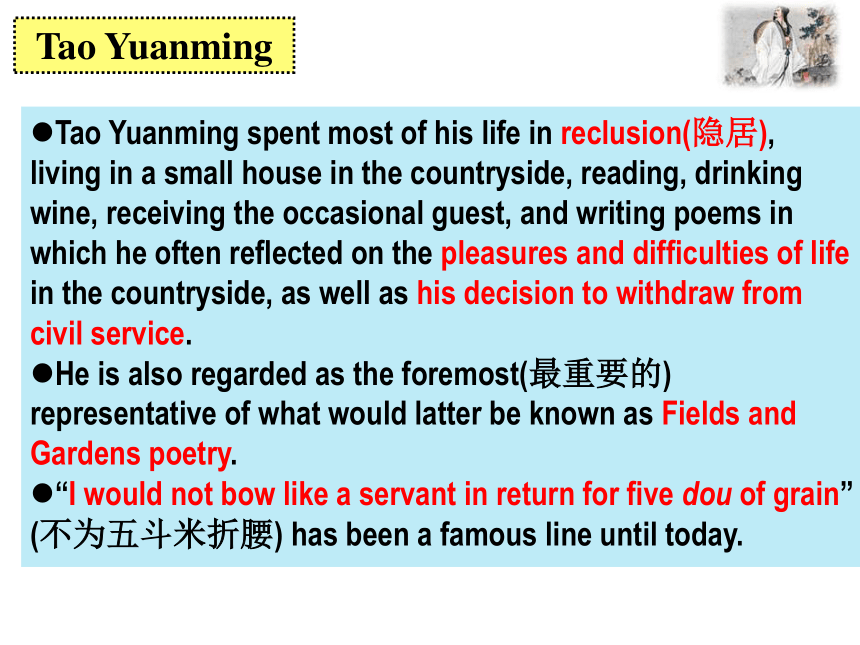
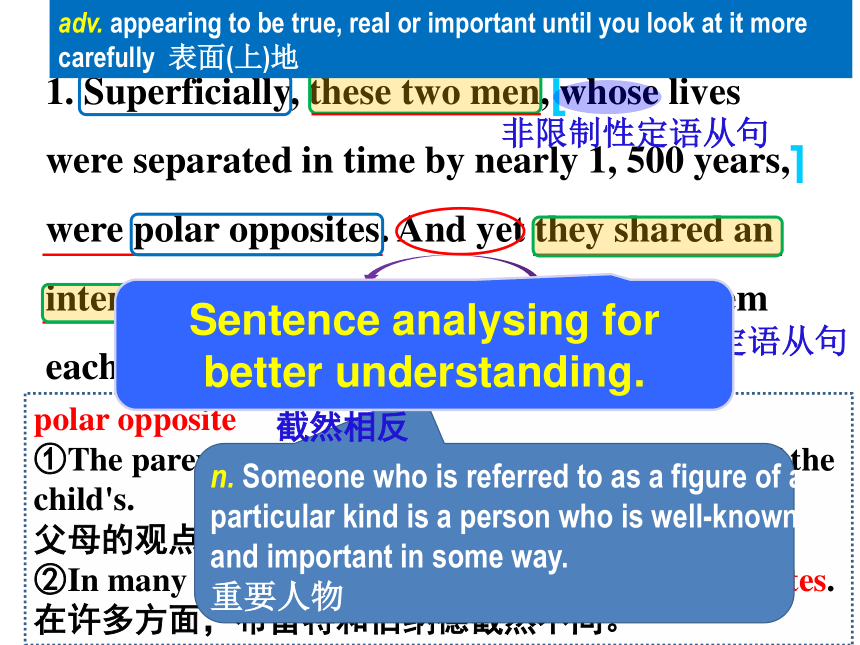
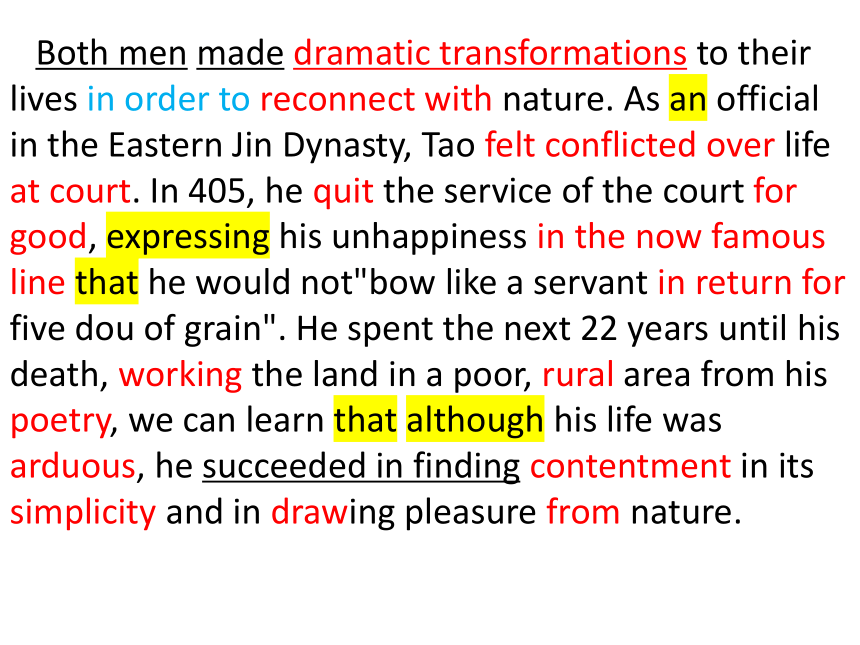

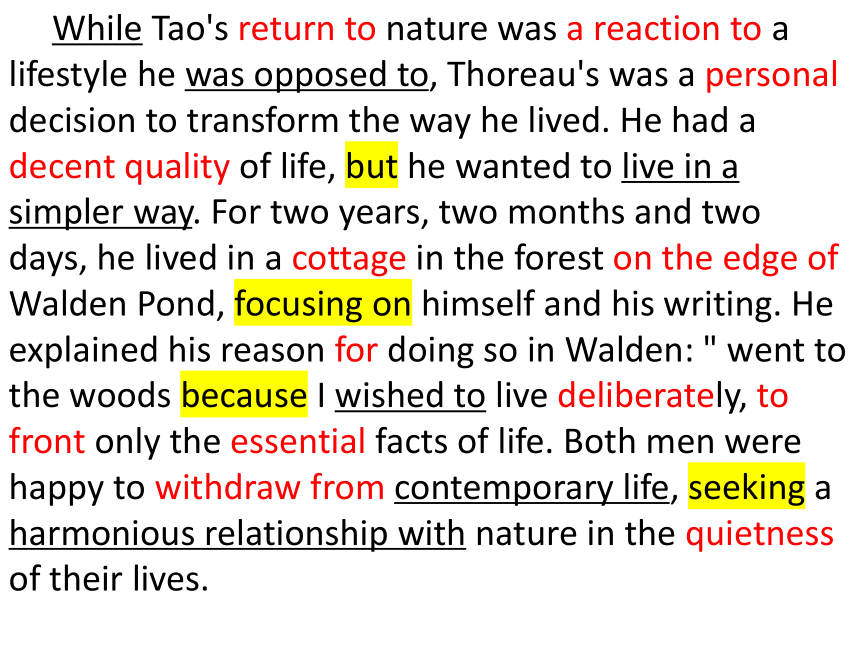
文档简介
(共25张PPT)
Unit 5
Developing ideas
Have you heard of the poem and the book below
饮酒 其五
结庐在人境,而无车马喧。
问君何能尔,心远地自偏。
采菊东篱下,悠然见南山;
山气日夕佳,飞鸟相与还。
此中有真意,欲辨已忘言。
Tao Yuanming
Henry David Thoreau
Who are the authors of them
What do you know about them
Returning to Live in the South (I)
When young, I'd not enjoyed the common pleasures,
My nature's basic love was for the hills.
Mistakenly I fell into the worldly net,
And thus remained for thirteen years.
A bird once caged must yearn for its old forest,
A fish in a pond will long to return to the lake.
So now I want to head to southern lands,
Returning to my fields and orchards there.
About ten acres of land is all I have,
Just eight or nine rooms there in my thatched hut.
There's shade from elms and willows behind the eaves,
Before the hall are gathered peaches and plums.
Beyond the dark and distance lies a village,
The smoke above reluctant to depart.
A dog is barking somewhere down the lane,
And chickens sit atop the mulberry tree.
The mundane world has no place in my home,
My modest rooms are for the most part vacant.
At last I feel released from my confinement,
I set myself to rights again.
Enjoy one of his poems
归园田居(其一)
陶渊明
少无适俗韵,
性本爱丘山。
误落尘网中,
一去十三年。
羁鸟恋旧林,
池鱼思故渊。
开荒南野际,
守拙归园田。
方宅十余亩,
草屋八九间。
榆柳荫后檐,
桃李罗堂前。
暧暧远人村,
依依墟里烟。
狗吠深巷中,
鸡鸣桑树颠。
户庭无尘杂,
虚室有余闲。
Find the Chinese version of Tao's poem, and translate Thoreau's quote into Chinese.
好好度过每一个季节,
呼吸新鲜的空气,
畅饮美酒,品尝水果,
尽情享受这一切。
让生活中只有饮食和草药。
Tao Yuanming
Henry David Thoreau
归园田居(其一)
陶渊明
少无适俗韵,性本爱丘山。
误落尘网中,一去十三年。
羁鸟恋旧林,池鱼思故渊。
开荒南野际,守拙归园田。
方宅十余亩,草屋八九间。
榆柳荫后檐,桃李罗堂前。
暧暧远人村,依依墟里烟。
狗吠深巷中,鸡鸣桑树颠。
户庭无尘杂,虚室有余闲。
Let’s read the short introductions to
Tao Yuanming and Henry David Thoreau.
What else do you know about them
P56 1
Tao Yuanming
Tao Yuanming spent most of his life in reclusion(隐居), living in a small house in the countryside, reading, drinking wine, receiving the occasional guest, and writing poems in which he often reflected on the pleasures and difficulties of life in the countryside, as well as his decision to withdraw from civil service.
He is also regarded as the foremost(最重要的) representative of what would latter be known as Fields and Gardens poetry.
“I would not bow like a servant in return for five dou of grain” (不为五斗米折腰) has been a famous line until today.
polar opposite
①The parents' position is often the polar opposite of the child's.
父母的观点常与孩子的完全相反。
②In many ways, Brett and Bernard are polar opposites.
在许多方面,布雷特和伯纳德截然不同。
1. Superficially, these two men, whose lives were separated in time by nearly 1, 500 years, were polar opposites. And yet they shared an intense respect for nature, which made them each an influential figure of their time.
非限制性定语从句
非限制性定语从句
n. Someone who is referred to as a figure of a particular kind is a person who is well-known and important in some way.
重要人物
截然相反
adv. appearing to be true, real or important until you look at it more carefully 表面(上)地
Sentence analysing for better understanding.
Both men made dramatic transformations to their lives in order to reconnect with nature. As an official in the Eastern Jin Dynasty, Tao felt conflicted over life at court. In 405, he quit the service of the court for good, expressing his unhappiness in the now famous line that he would not"bow like a servant in return for five dou of grain". He spent the next 22 years until his death, working the land in a poor, rural area from his poetry, we can learn that although his life was arduous, he succeeded in finding contentment in its simplicity and in drawing pleasure from nature.
1.Why did Tao Yuanming quit the service of the court
A. He was paid only five dou of grain.
B. He was tired of the conflict over life at court.
C. He could live a decent life in the rural area.
D. He was forced to do this by his superior.
While Tao's return to nature was a reaction to a lifestyle he was opposed to, Thoreau's was a personal decision to transform the way he lived. He had a decent quality of life, but he wanted to live in a simpler way. For two years, two months and two days, he lived in a cottage in the forest on the edge of Walden Pond, focusing on himself and his writing. He explained his reason for doing so in Walden: " went to the woods because I wished to live deliberately, to front only the essential facts of life. Both men were happy to withdraw from contemporary life, seeking a harmonious relationship with nature in the quietness of their lives.
2.Why did Thoreau return to nature
A. He wanted to transform the way he lived.
B. He wanted to follow the example of Tao Yuanming.
C. His hut(小屋) in the forest needed cleaning.
D. His life was hard.
Although Tao and Thoreau do not treat nature in quite the same way, their works show its beauty and value. Tao's nature is a place of fields and villages, in other words, rural, and his animals are domestic ones, such as chickens and dogs. The calm and peaceful life he wrote about is in contrast to and critical of the depressive court life:
Thoreau's descriptions of nature emphasised the beauty and purity of the wild areas around him Devoting himself to observations of the natural phenomena,he recorded his detailed findings in his journals. Thoreau's writing aimed to convince people that animals and plants had a right to live and prosper, as we do. We should live with them in harmony and enjoy nature's gifts, as he describes in his journals:
3. What did they have in common
A. They treated nature in the same way.
B. They both lived in the 19th century.
C. They were both responsible for their families. D. Their works showed the beauty of nature.
Live in each season as it passes; breathe the air, drink the drink, taste the fruit, and resign yourself to the influences of each. Let them be your only diet, drink and botanical medicines.
It takes considerable courage to reject the easy and familiar and instead try to live closer to nature, as both Tao and Thoreau did. Their choices led them to quiet and reflective lives with fewer material desires. In today's modern world, their ideas about living simply and being at ease with nature may take us a step closer to attaining personal well-being and fulfilment.
4. What does Thoreau’s work mainly embody(体现)
A. Nature's wildness is beautiful.
B. We should raise more animals.
C. Man should live in harmany with nature.
D. We should eat more fruit.
5. How does the author develop the text
A. By describing
B. By quoting
C. By comparing
D. By reasoning(推理)
2. In 405, he quit the service of the court for good, expressing his unhappiness in the now famous line that he would not “bow like a servant in return for five dou of grain”.
in return for
as a payment or in exchange for sth, or as a way of thanking sb for sth 作为……的回报
① I paid a visit to him yesterday in return for his help.
为答谢他的帮助我昨天去拜访了他。
② He gave me a gift in return for my help.
他给我一个礼物作为我帮助他的回报。
V-ing短语作状语
that引导同位语从句
公元405年,陶渊明辞去了官职,以表达他对仕途的不满,用今天的一句名言形容就是“不为五斗米折腰”。
I. 用合适的关系代词填空。
1. My brother, _______ skin is a little black, has a slim figure.
2. She married Joe, ________ surprised everyone.
whose
which
Decide which portrayal of nature you prefer and make notes.
Organise your thoughts and share them with the class.
Both passages have the common theme of learning from nature. The first passage focuses on the inspirations people get from nature, while the second focuses more on the natural way of living that people still need today. The second passage calls upon us to live in harmony with nature, which is an important message for today.
Compare the two reading passages in this unit. In what ways does each passage contribute to the unit theme
P58 3
Possible answers:
Now 2 mins to test our spelling.
1. English-Chinese
withdraw reluctant deliberately
depressive superficially purity
resign botanical evaluate
2. Chinese- English
鞠躬 农村的,乡村的 乡村小屋
驯养的,家养的 得到, 获得
不拘束,放松
Spelling Bee
When finishing, exchange to see who does the best.
1. 截然相反
2. 作为……的回报
3. 从……中得到
4. 对……的反应
5. 退出
6. 听任;顺从
7.寻求与自然和谐的关系
8. 个人的幸福和满足感
polar opposite
in return for
draw… from
reaction to
withdraw from
resign oneself to
seek a harmonious relationship with nature
personal well-being and fulfilment
Review
Write an article about what inspiration you can get from the passage.
Unit 5
Developing ideas
Have you heard of the poem and the book below
饮酒 其五
结庐在人境,而无车马喧。
问君何能尔,心远地自偏。
采菊东篱下,悠然见南山;
山气日夕佳,飞鸟相与还。
此中有真意,欲辨已忘言。
Tao Yuanming
Henry David Thoreau
Who are the authors of them
What do you know about them
Returning to Live in the South (I)
When young, I'd not enjoyed the common pleasures,
My nature's basic love was for the hills.
Mistakenly I fell into the worldly net,
And thus remained for thirteen years.
A bird once caged must yearn for its old forest,
A fish in a pond will long to return to the lake.
So now I want to head to southern lands,
Returning to my fields and orchards there.
About ten acres of land is all I have,
Just eight or nine rooms there in my thatched hut.
There's shade from elms and willows behind the eaves,
Before the hall are gathered peaches and plums.
Beyond the dark and distance lies a village,
The smoke above reluctant to depart.
A dog is barking somewhere down the lane,
And chickens sit atop the mulberry tree.
The mundane world has no place in my home,
My modest rooms are for the most part vacant.
At last I feel released from my confinement,
I set myself to rights again.
Enjoy one of his poems
归园田居(其一)
陶渊明
少无适俗韵,
性本爱丘山。
误落尘网中,
一去十三年。
羁鸟恋旧林,
池鱼思故渊。
开荒南野际,
守拙归园田。
方宅十余亩,
草屋八九间。
榆柳荫后檐,
桃李罗堂前。
暧暧远人村,
依依墟里烟。
狗吠深巷中,
鸡鸣桑树颠。
户庭无尘杂,
虚室有余闲。
Find the Chinese version of Tao's poem, and translate Thoreau's quote into Chinese.
好好度过每一个季节,
呼吸新鲜的空气,
畅饮美酒,品尝水果,
尽情享受这一切。
让生活中只有饮食和草药。
Tao Yuanming
Henry David Thoreau
归园田居(其一)
陶渊明
少无适俗韵,性本爱丘山。
误落尘网中,一去十三年。
羁鸟恋旧林,池鱼思故渊。
开荒南野际,守拙归园田。
方宅十余亩,草屋八九间。
榆柳荫后檐,桃李罗堂前。
暧暧远人村,依依墟里烟。
狗吠深巷中,鸡鸣桑树颠。
户庭无尘杂,虚室有余闲。
Let’s read the short introductions to
Tao Yuanming and Henry David Thoreau.
What else do you know about them
P56 1
Tao Yuanming
Tao Yuanming spent most of his life in reclusion(隐居), living in a small house in the countryside, reading, drinking wine, receiving the occasional guest, and writing poems in which he often reflected on the pleasures and difficulties of life in the countryside, as well as his decision to withdraw from civil service.
He is also regarded as the foremost(最重要的) representative of what would latter be known as Fields and Gardens poetry.
“I would not bow like a servant in return for five dou of grain” (不为五斗米折腰) has been a famous line until today.
polar opposite
①The parents' position is often the polar opposite of the child's.
父母的观点常与孩子的完全相反。
②In many ways, Brett and Bernard are polar opposites.
在许多方面,布雷特和伯纳德截然不同。
1. Superficially, these two men, whose lives were separated in time by nearly 1, 500 years, were polar opposites. And yet they shared an intense respect for nature, which made them each an influential figure of their time.
非限制性定语从句
非限制性定语从句
n. Someone who is referred to as a figure of a particular kind is a person who is well-known and important in some way.
重要人物
截然相反
adv. appearing to be true, real or important until you look at it more carefully 表面(上)地
Sentence analysing for better understanding.
Both men made dramatic transformations to their lives in order to reconnect with nature. As an official in the Eastern Jin Dynasty, Tao felt conflicted over life at court. In 405, he quit the service of the court for good, expressing his unhappiness in the now famous line that he would not"bow like a servant in return for five dou of grain". He spent the next 22 years until his death, working the land in a poor, rural area from his poetry, we can learn that although his life was arduous, he succeeded in finding contentment in its simplicity and in drawing pleasure from nature.
1.Why did Tao Yuanming quit the service of the court
A. He was paid only five dou of grain.
B. He was tired of the conflict over life at court.
C. He could live a decent life in the rural area.
D. He was forced to do this by his superior.
While Tao's return to nature was a reaction to a lifestyle he was opposed to, Thoreau's was a personal decision to transform the way he lived. He had a decent quality of life, but he wanted to live in a simpler way. For two years, two months and two days, he lived in a cottage in the forest on the edge of Walden Pond, focusing on himself and his writing. He explained his reason for doing so in Walden: " went to the woods because I wished to live deliberately, to front only the essential facts of life. Both men were happy to withdraw from contemporary life, seeking a harmonious relationship with nature in the quietness of their lives.
2.Why did Thoreau return to nature
A. He wanted to transform the way he lived.
B. He wanted to follow the example of Tao Yuanming.
C. His hut(小屋) in the forest needed cleaning.
D. His life was hard.
Although Tao and Thoreau do not treat nature in quite the same way, their works show its beauty and value. Tao's nature is a place of fields and villages, in other words, rural, and his animals are domestic ones, such as chickens and dogs. The calm and peaceful life he wrote about is in contrast to and critical of the depressive court life:
Thoreau's descriptions of nature emphasised the beauty and purity of the wild areas around him Devoting himself to observations of the natural phenomena,he recorded his detailed findings in his journals. Thoreau's writing aimed to convince people that animals and plants had a right to live and prosper, as we do. We should live with them in harmony and enjoy nature's gifts, as he describes in his journals:
3. What did they have in common
A. They treated nature in the same way.
B. They both lived in the 19th century.
C. They were both responsible for their families. D. Their works showed the beauty of nature.
Live in each season as it passes; breathe the air, drink the drink, taste the fruit, and resign yourself to the influences of each. Let them be your only diet, drink and botanical medicines.
It takes considerable courage to reject the easy and familiar and instead try to live closer to nature, as both Tao and Thoreau did. Their choices led them to quiet and reflective lives with fewer material desires. In today's modern world, their ideas about living simply and being at ease with nature may take us a step closer to attaining personal well-being and fulfilment.
4. What does Thoreau’s work mainly embody(体现)
A. Nature's wildness is beautiful.
B. We should raise more animals.
C. Man should live in harmany with nature.
D. We should eat more fruit.
5. How does the author develop the text
A. By describing
B. By quoting
C. By comparing
D. By reasoning(推理)
2. In 405, he quit the service of the court for good, expressing his unhappiness in the now famous line that he would not “bow like a servant in return for five dou of grain”.
in return for
as a payment or in exchange for sth, or as a way of thanking sb for sth 作为……的回报
① I paid a visit to him yesterday in return for his help.
为答谢他的帮助我昨天去拜访了他。
② He gave me a gift in return for my help.
他给我一个礼物作为我帮助他的回报。
V-ing短语作状语
that引导同位语从句
公元405年,陶渊明辞去了官职,以表达他对仕途的不满,用今天的一句名言形容就是“不为五斗米折腰”。
I. 用合适的关系代词填空。
1. My brother, _______ skin is a little black, has a slim figure.
2. She married Joe, ________ surprised everyone.
whose
which
Decide which portrayal of nature you prefer and make notes.
Organise your thoughts and share them with the class.
Both passages have the common theme of learning from nature. The first passage focuses on the inspirations people get from nature, while the second focuses more on the natural way of living that people still need today. The second passage calls upon us to live in harmony with nature, which is an important message for today.
Compare the two reading passages in this unit. In what ways does each passage contribute to the unit theme
P58 3
Possible answers:
Now 2 mins to test our spelling.
1. English-Chinese
withdraw reluctant deliberately
depressive superficially purity
resign botanical evaluate
2. Chinese- English
鞠躬 农村的,乡村的 乡村小屋
驯养的,家养的 得到, 获得
不拘束,放松
Spelling Bee
When finishing, exchange to see who does the best.
1. 截然相反
2. 作为……的回报
3. 从……中得到
4. 对……的反应
5. 退出
6. 听任;顺从
7.寻求与自然和谐的关系
8. 个人的幸福和满足感
polar opposite
in return for
draw… from
reaction to
withdraw from
resign oneself to
seek a harmonious relationship with nature
personal well-being and fulfilment
Review
Write an article about what inspiration you can get from the passage.
